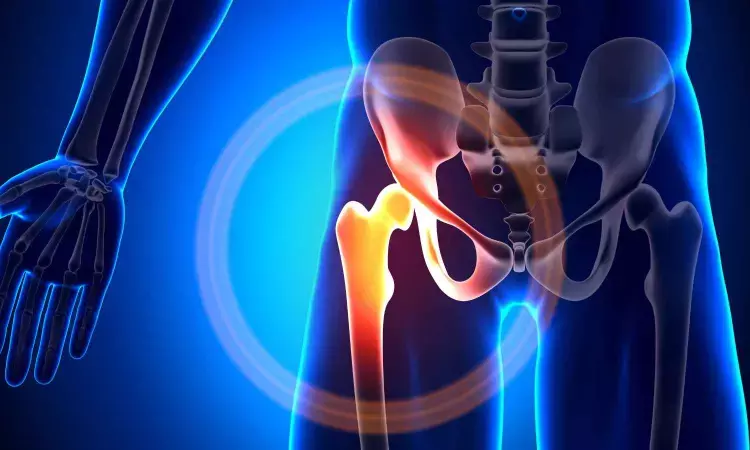- Home
- Medical news & Guidelines
- Anesthesiology
- Cardiology and CTVS
- Critical Care
- Dentistry
- Dermatology
- Diabetes and Endocrinology
- ENT
- Gastroenterology
- Medicine
- Nephrology
- Neurology
- Obstretics-Gynaecology
- Oncology
- Ophthalmology
- Orthopaedics
- Pediatrics-Neonatology
- Psychiatry
- Pulmonology
- Radiology
- Surgery
- Urology
- Laboratory Medicine
- Diet
- Nursing
- Paramedical
- Physiotherapy
- Health news
- Fact Check
- Bone Health Fact Check
- Brain Health Fact Check
- Cancer Related Fact Check
- Child Care Fact Check
- Dental and oral health fact check
- Diabetes and metabolic health fact check
- Diet and Nutrition Fact Check
- Eye and ENT Care Fact Check
- Fitness fact check
- Gut health fact check
- Heart health fact check
- Kidney health fact check
- Medical education fact check
- Men's health fact check
- Respiratory fact check
- Skin and hair care fact check
- Vaccine and Immunization fact check
- Women's health fact check
- AYUSH
- State News
- Andaman and Nicobar Islands
- Andhra Pradesh
- Arunachal Pradesh
- Assam
- Bihar
- Chandigarh
- Chattisgarh
- Dadra and Nagar Haveli
- Daman and Diu
- Delhi
- Goa
- Gujarat
- Haryana
- Himachal Pradesh
- Jammu & Kashmir
- Jharkhand
- Karnataka
- Kerala
- Ladakh
- Lakshadweep
- Madhya Pradesh
- Maharashtra
- Manipur
- Meghalaya
- Mizoram
- Nagaland
- Odisha
- Puducherry
- Punjab
- Rajasthan
- Sikkim
- Tamil Nadu
- Telangana
- Tripura
- Uttar Pradesh
- Uttrakhand
- West Bengal
- Medical Education
- Industry
Delayed Hip Fracture Surgery Increases 30-Day Mortality in Older Adults, finds study

A new study published in the journal of BMC Surgery revealed that longer waiting times before hip fracture surgery were linked to higher 30-day mortality risk in elderly patients, with a threshold of around 42 hours marking significantly increased risk.
This study from the Affiliated Kunshan Hospital of Jiangsu University conducted a retrospective cohort study of 818 patients aged 65 and older who underwent surgery for hip fractures between January 2017 and July 2022. The study examined patient outcomes relative to surgical delays, highlights the importance of timely surgical intervention to improve survival chances in older individuals.
The study evaluated a broad range of clinical and demographic factors. These included patients’ age, gender, body mass index (BMI), type of hip fracture, surgical procedure performed, anesthesia risk (measured by American Society of Anesthesiologists score), operation time, month and week of hospital admission, and key laboratory test results. By controlling for these covariates through logistic regression analysis, this study isolated the independent effect of waiting time on 30-day mortality.
The analysis demonstrated a clear positive association between waiting time and the risk of death within 30 days of surgery. Specifically, the results indicated that every additional 10 hours of surgical delay was linked to a 13.6% increase in 30-day mortality (odds ratio [OR] 1.136; 95% confidence interval [CI], 1.027–1.256; P = 0.0136).
The relationship between waiting time and mortality was not linear. Statistical modeling revealed a threshold effect, when the waiting period was less than 42.4 hours, there was no detectable increase in 30-day mortality risk.
However, delays beyond 42.4 hours were associated with a sharply elevated risk of death. This nonlinear pattern emphasizes that while minor surgical delays may not be fatal, longer postponements can have serious, life-threatening consequences.
The findings carry significant implications for hospitals and healthcare policymakers. In many clinical settings, delays in hip fracture surgery occur due to resource constraints, patient stabilization needs, or scheduling bottlenecks. The evidence from this study suggests that efforts to reduce waiting times could markedly improve survival outcomes in elderly patients.
Overall, the study highlights the urgent need to treat hip fractures in older adults as a medical emergency requiring prompt surgical intervention. The identified threshold of 42 hours may serve as a clinical benchmark for prioritizing surgical scheduling and optimizing patient outcomes.
Source:
Xu, M.-Z., Lu, K., Ye, Y.-W., Xu, S.-M., Shi, Q., Gong, Y.-Q., & Li, C. (2025). Waiting time and 30-day mortality association in elderly patients having hip fracture surgery. BMC Surgery, 25(1). https://doi.org/10.1186/s12893-025-03140-z
Neuroscience Masters graduate
Jacinthlyn Sylvia, a Neuroscience Master's graduate from Chennai has worked extensively in deciphering the neurobiology of cognition and motor control in aging. She also has spread-out exposure to Neurosurgery from her Bachelor’s. She is currently involved in active Neuro-Oncology research. She is an upcoming neuroscientist with a fiery passion for writing. Her news cover at Medical Dialogues feature recent discoveries and updates from the healthcare and biomedical research fields. She can be reached at editorial@medicaldialogues.in
Dr Kamal Kant Kohli-MBBS, DTCD- a chest specialist with more than 30 years of practice and a flair for writing clinical articles, Dr Kamal Kant Kohli joined Medical Dialogues as a Chief Editor of Medical News. Besides writing articles, as an editor, he proofreads and verifies all the medical content published on Medical Dialogues including those coming from journals, studies,medical conferences,guidelines etc. Email: drkohli@medicaldialogues.in. Contact no. 011-43720751


